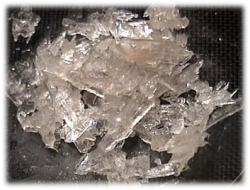Methamphetamine Withdrawal
Signs, Symptoms & Treatment for Meth Addiction

Crystal meth is a dangerous substance.
Studies show that methamphetamine withdrawal can consist of two distinct phases which may last anywhere from a couple of days to a couple of weeks to effectively overcome. While the very first phase of methamphetamine withdrawal is by far the most difficult to cope with, it tends to be the shortest and only lasts about 24-36 hours. In most cases, this phase of withdrawal weakens in intensity over the following 3-14 days resulting in a more lax, easier to cope with situation.
Following the intensity of the first stage of methamphetamine withdrawal, the user will transition into the second, weaker phase of withdrawal which will typically last 2-4 weeks. Meth withdrawal symptoms often resemble those that are medically termed as post acute withdrawal syndrome (PAWS).
If you or someone you know is addicted to methamphetamine and trying to do what it takes to stop using, seeking professional help for the symptoms of withdrawal may be the best chance you have at getting sober, staying sober and making a full recovery. Professional meth addiction treatment programs provide you with the supportive care and around-the-clock monitoring to help you stay sober despite the challenges that present as a result of withdrawal.
Treatment for Meth Withdrawal
Crystal meth withdrawal can vary in intensity depending on various factors and the level of use that the user has taken part in. For a short-term methamphetamine abuse situation, withdrawal symptoms may only last a few short days and not be super intense but in cases in which the drug was abused for weeks or months or even years on end, the symptoms of withdrawal can be painstakingly difficult to cope with. Some of the situations that can increase the intensity of methamphetamine withdrawal include:
- Severity of the addiction
- Amount of time that the user abused meth and whether or not other drugs were also being used
- Amount of methamphetamine being used in a single dose or binge
- Method of meth use (smoking, snorting or injecting)
- Other health complications
- Mental illness
Fortunately, there is treatment for methamphetamine withdrawal and it can really help when it comes to narrowing down the extent of the symptoms and the level of urges or cravings that come about during recovery. Treatment for methamphetamine withdrawal will most often consist of:
- Antipsychotic medication in the event that there is a methamphetamine induced psychosis that must be treated
- Anti-anxiety medication for the treatment of nervousness, anxiety and restlessness
- Sleeping medications to help restore proper sleep schedules
- Assessment of potential dangerous or suicidal thoughts or ideations
- Counseling for depression or mental instability
Finding Treatment
While it may take a period of time for you to full overcome methamphetamine addiction and the withdrawal symptoms that come from abruptly quitting the use of this drug, there is hope and help available which can make your recovery more accessible. The first steps to getting sober and healing from methamphetamine addiction are to seek professional treatment by calling our helpline at 1-888-716-9806 to talk with a treatment specialist. Get help today!
